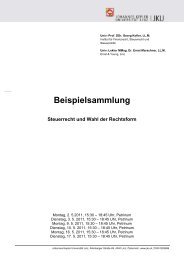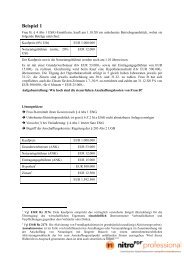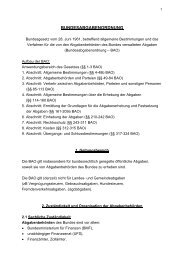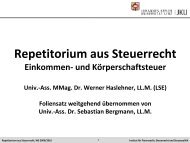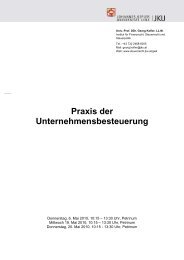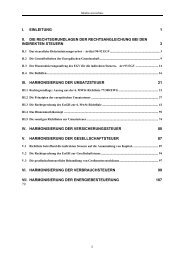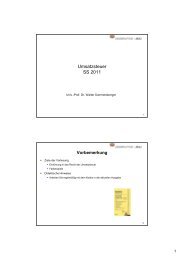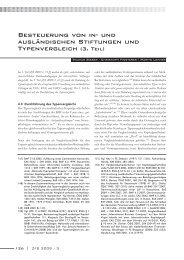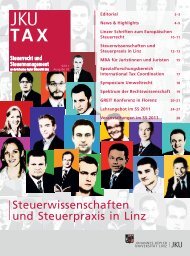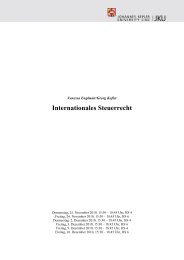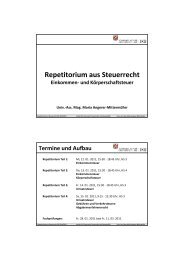European Tax Law - JKU
European Tax Law - JKU
European Tax Law - JKU
Sie wollen auch ein ePaper? Erhöhen Sie die Reichweite Ihrer Titel.
YUMPU macht aus Druck-PDFs automatisch weboptimierte ePaper, die Google liebt.
damental freedoms under the EC Treaty results in creating<br />
“new taxing rights” which did not exist before. This is<br />
indeed the inevitable consequence of using the technique<br />
of “fundamental rights” under the EC Treaty, but<br />
also under other international treaties and even under<br />
national constitutions.<br />
If we look at the legal consequences of the application of<br />
fundamental rights by national constitutional courts in<br />
national legal systems, we find that, on the basis of these<br />
fundamental rights, the constitutional courts have created<br />
rights to employment and access to professions,<br />
education and equal pay that did not exist before. In fact,<br />
in the area of non-discrimination or equal protection<br />
under the law, the national constitutional courts have<br />
used exactly the same technique as the ECJ by using<br />
their negative power to strike down national statutes and<br />
other regulations that excluded women or specific<br />
minority groups from access to professions, education,<br />
employment, medical care, etc. The major difference<br />
with the EU has been that the national legislature in<br />
most, but not all, cases has reacted very quickly to implement<br />
the constitutional court’s negative decisions in a<br />
positive way in the framework of national legislation. In<br />
creating these “rights”, including “taxing rights”, the ECJ<br />
has acted precisely in the same way as international<br />
courts and national supreme and constitutional courts<br />
have acted on the basis of similar legal texts.<br />
The argument that the ECJ has no legitimate basis to<br />
make such decisions because it was not elected is not<br />
valid because national constitutional courts are also not<br />
elected. The constitutional freedoms on which they<br />
based their decisions have, of course, been approved by<br />
democratically elected constitutional assemblies, but so<br />
has the EC Treaty been approved in special laws by all<br />
democratically elected national parliaments of all the<br />
Member States.<br />
The argument that no one could have envisaged on 25<br />
March 1957 at the signing of the Treaty of Rome the farreaching<br />
consequences for direct taxation of the fundamental<br />
freedoms is also not valid. This is clear when we<br />
apply the same reasoning outside the area of taxation.<br />
Most people could also not have envisaged the farreaching<br />
consequences for criminal law, family law or<br />
labour or educational law of some national constitutional<br />
and international treaty freedoms with respect to<br />
the rights of minority groups. This has not been a valid<br />
reason for rejecting the decisions of courts in creating or<br />
upholding these rights on the basis of international<br />
treaties or constitutional texts.<br />
This way of making tax laws is rather new. It is not the<br />
traditional way founded on the principle of “no taxation<br />
without representation”, which is strongly based on the<br />
principle of legality and the approval of detailed statutes<br />
in parliament. We should not overlook the fact, however,<br />
that in many other areas of law, including even criminal<br />
law, judge-made case law by the <strong>European</strong> Court of<br />
Human Rights has sometimes taken the place of the<br />
national legislature. In all these cases, it is because the<br />
legislature was unwilling to confront these new develop-<br />
Articles<br />
ments that judges have taken the driver’s seat. But their<br />
decisions are always based on treaty provisions that were<br />
democratically approved by national parliaments.<br />
3.3. In which direction should the ECJ go?<br />
3.3.1. Role of the concept of the internal market<br />
Once we have accepted that the application of the fundamental<br />
freedoms by court decisions inevitably results<br />
in changing the substantive national tax law by abolishing<br />
some tax rules and thereby creating some new taxing<br />
rights, the question put by García Prats and Pistone, of<br />
course, remains: In which direction to go? The easy and<br />
general answer to this question is clear: in the direction<br />
of an internal market without borders and free and fair<br />
competition and in the direction of a level playing field<br />
at the snooker table. That, however, is only part of the<br />
answer. The other part is that, within the internal market,<br />
the Member States should have viable national tax systems<br />
capable of raising the major part of the revenue<br />
needed to provide public services for their citizens,<br />
although the EC Treaty does not contain substantive tax<br />
principles to build such national systems. The more difficult<br />
question is: What is the correct balance between<br />
these two objectives and which are the fundamental<br />
principles achieving such balance?<br />
There are many questions of tax policy on which the<br />
concept of the internal market does not give the slightest<br />
indication of an answer and on which consequently the<br />
ECJ should not take a position – for example: double or<br />
single taxation of dividend distributions to individuals,<br />
the unit for personal income taxation (couple or individual),<br />
the progressivity of the tax scale in the personal<br />
income tax, etc. Regarding such questions, the role of the<br />
ECJ should be to stay out of any possible discussion of<br />
these issues in the framework of a national tax system.<br />
3.3.2. Concept of the internal market is decisive between<br />
CLIN and CLEN<br />
There is, however, one major question of policy on<br />
which the ECJ could justifiably take a position, and that<br />
is the question whether CLEN or CLIN is the tax system<br />
most compatible with the internal market. Many academics<br />
in Europe have made a convincing plea from a<br />
theoretical point of view to adopt CLIN as the general<br />
tax system for the internal market. The essence of the<br />
internal market has indeed been defined in Arts. 3(c)<br />
and (g) of the EC Treaty as: “A ... market characterised by<br />
the abolition, as between Member States, of obstacles to<br />
free movement of goods, persons, services and capital ....<br />
And a system ensuring that competition ... is not distorted.”<br />
24 The core of the internal market is based on<br />
competition, not only between business enterprises, but<br />
also between the tax systems of the Member States, and<br />
24. Although in the renewed Treaty agreed upon at the Lisbon summit in<br />
October 2007 the notion of competition is no longer specifically mentioned<br />
in the concept of the internal market, the protocol to the Treaty makes it clear<br />
that this vital element in the definition of the internal market remains<br />
unchanged.<br />
© IBFD BULLETIN FOR INTERNATIONAL TAXATION MARCH 2008 95




